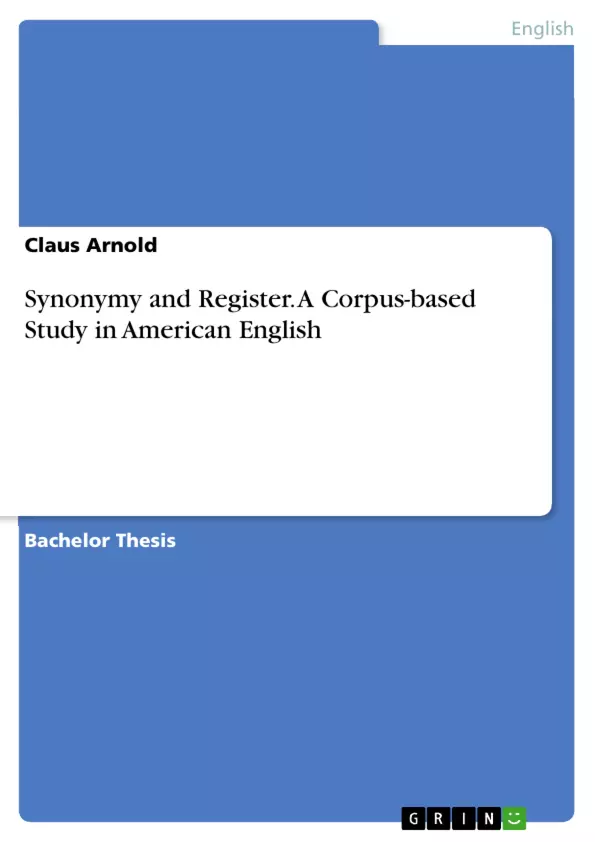Die vorliegende Arbeit setzt sich aus einer pragmatischen Perspektive mit dem sprachlichen Phänomen der Synonymie im heutigen Amerikanischen Englisch auseinander. Mithilfe des Corpus of Contemporary American English, bekannt als COCA, sollen quantitative und qualitative Unterschiede zwischen Wörtern mit gleicher oder zumindest sehr ähnlicher denotativer Bedeutung im Sprachgebrauch untersucht werden.
Dazu werden in einer synchronischen Studie, die den Zeitraum von 2005 bis 2009 zugrunde legt, elf Gruppen mit jeweils zwei bis drei Synonymen, z.B. maybe/perhaps, analysiert. Zum einen sollen die Synonyme einer Gruppe hinsichtlich ihrer Gesamthäufigkeit im Corpus miteinander verglichen werden, zum anderen hinsichtlich ihrer quantitativen Verteilung über fünf sprachliche Register: Gesprochene Sprache, Fiktion, Magazine, Tageszeitungen und akademische Texte. Im Anschluss an die einzelnen Analysen werden Analogien und Unterschiede zwischen den Ergebnissen der Gruppen im Hinblick auf die unten genannten zentralen Thesen der Arbeit interpretiert.
Die Studie soll zum einen nachweisen, dass es in einer Gruppe von Synonymen in der Regel ein Lexem gibt, das viel häufiger verwendet wird als die anderen Lexeme und demnach als alltäglicher bzw. weniger formell angesehen werden kann. Weiterhin sollen die Ergebnisse Hinweise für einen Zusammenhang zwischen der angeblichen (In-)Formalität eines Wortes und seiner bevorzugten Verwendung in bestimmten Registern liefern. Dabei gehe ich davon aus, dass informellere Lexeme besonders in informelleren Registern gebraucht werden, formellere Lexeme dagegen in formelleren. Als untergeordneter Faktor wird der etymologische Ursprung der Synonyme hinzugezogen, wobei das Augenmerk auf der Opposition von germanischer und romanischer Abstammung liegt.
Inhaltsverzeichnis (Table of Contents)
- Introduction
- Background
- Synonymy
- Degrees of Synonymy
- Foreign Loans as a Source of Synonymy in English
- Register
- Components of a Register
- Register and Formality
- The Registers in COCA
- Synonymy
- Study
- Finding Sample Synonyms
- Method
- Analysis
- Couch vs. Sofa
- Enemy vs. Foe
- Noon vs. Midday
- Start [V], Begin, and Commence
- Stroll, Amble, and Saunter as Verbs
- Annual vs. Yearly as Adjectives
- Adept vs. Skillful/Skilful
- Maybe vs. Perhaps as Adverbs
- Synonymous Adverbs Referring to Frequency and Infrequency
- Probably vs. likely [ADV]
- Discussion
- Preference for One Synonym over Another
- Patterns of Register-based Distribution
- Origin as a Constraint
Zielsetzung und Themenschwerpunkte (Objectives and Key Themes)
This study aims to investigate the use of synonyms in English by analyzing their frequency and distribution across different registers. The research focuses on exploring whether differences in the formality of synonymous terms are reflected in their usage patterns within various registers.- The concept of synonymy and its degrees
- The role of register and formality in language use
- The impact of etymological origin on the distribution of synonyms
- The preference for one synonym over another based on register and formality
- The relationship between frequency and register-based distribution of synonyms
Zusammenfassung der Kapitel (Chapter Summaries)
- Introduction: This chapter introduces the concept of synonymy and its significance in the structure of vocabulary. It outlines the study's objectives and methodology, highlighting the importance of investigating quantitative and qualitative differences between synonyms.
- Background: This chapter delves into the concept of synonymy, defining its meaning and presenting different degrees of synonymy. It discusses the impact of foreign loans on the frequency of synonyms, providing a foundation for the analysis in subsequent chapters.
- Study: This chapter outlines the methods and procedures employed in the corpus-based study. It describes how the sample synonyms were chosen and the criteria used for analyzing their distribution across different registers.
- Analysis: This chapter presents a detailed analysis of eleven synonym groups, examining their peculiarities and analyzing their corpus-based data. The analysis focuses on quantifying and qualitatively comparing the usage of each synonym across different registers.
- Discussion: This chapter discusses the findings of the study, analyzing the relationships between the frequency, register-based distribution, and etymological origin of synonyms. It explores whether the study's assumptions regarding the influence of formality and register on synonym choice are supported by the data.
Schlüsselwörter (Keywords)
This study explores the nuances of synonymy in English, particularly focusing on the interplay of register and formality. The research investigates the distribution of synonyms across different registers, analyzing quantitative and qualitative differences in their usage. The study also examines the influence of etymological origin, specifically the Germanic vs. Romance distinction, on the preference for certain synonyms.Frequently Asked Questions
What is the focus of this corpus-based study?
The study investigates synonymy in American English, focusing on how frequency and distribution of synonymous words vary across different linguistic registers using the COCA corpus.
Which registers were analyzed in the study?
The study analyzed five registers: Spoken language, Fiction, Magazines, Newspapers, and Academic texts.
How does formality affect the choice of synonyms?
The research assumes that informal lexemes are preferred in informal registers (like spoken language), while formal lexemes are more frequent in formal registers (like academic texts).
What role does etymology play in synonym distribution?
The study examines the opposition between Germanic and Romance origins, suggesting that origin can be a constraint on which synonym is preferred in a specific context.
What is COCA?
COCA stands for the Corpus of Contemporary American English, a large-scale database used for quantitative and qualitative linguistic analysis.
Give examples of synonym groups analyzed in the text.
Analyzed groups include maybe/perhaps, couch/sofa, enemy/foe, start/begin/commence, and annual/yearly.
- Quote paper
- Claus Arnold (Author), 2012, Synonymy and Register. A Corpus-based Study in American English, Munich, GRIN Verlag, https://www.grin.com/document/287190



